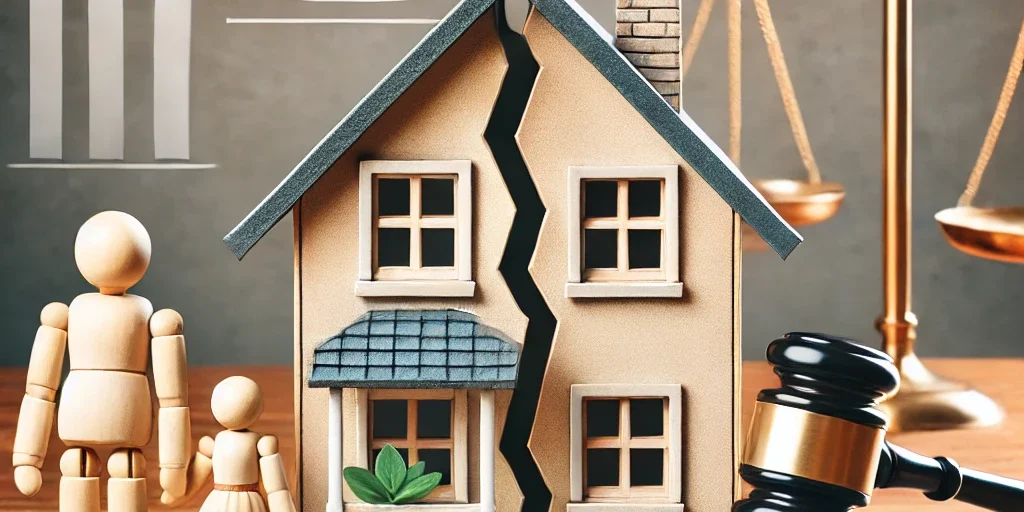Gray divorce is becoming more and more common in New Jersey. This means that couples over 50 often have to make a complicated choice about what to do with their family home. After years of paying for a mortgage or sharing ownership with your spouse, the family home is not only a valuable asset but a significant emotional investment. Deciding whether to sell, buy out, or keep the family home can greatly affect your financial stability post-divorce, and each option comes with distinct pros and cons.
Here’s a closer look at what’s involved when deciding the future of the family home in a gray divorce in New Jersey.
Key Takeaways
- In NJ, the family home is considered marital property if acquired or maintained during the marriage, making it subject to equitable distribution.
- Selling and splitting the proceeds offers financial flexibility but can be emotionally difficult and may involve unfavorable timing.
- One spouse can buy out the other’s share, providing stability, though refinancing and upkeep costs may be challenging.
- Keeping the home jointly can benefit children or delay selling, but it may lead to conflicts and ongoing financial ties.
- Each option has tax implications, such as capital gains from selling or refinancing costs, affecting long-term financial planning.
Sell, Buy Out, or Keep the Family Home in NJ Gray Divorce
| Option | Benefits | Drawbacks |
|---|---|---|
| Selling the Home | Financial flexibility, fresh start | Emotional impact, potential capital gains taxes |
| Buying Out Ex-Spouse | Stability, avoids moving, maintains familiarity | Costly refinancing, long-term maintenance expenses |
| Keeping the Home Jointly | Stability for children, allows for delayed sale | Financial ties to ex-spouse, potential for conflicts |
| Tax Implications | Capital gains if appreciated, refinancing fees | Must consider long-term financial planning |
| Best for | Couples seeking financial liquidity | Those who want stability and can afford upkeep |
Is The Family House Considered Marital Property in New Jersey?
Yes, in New Jersey, the family house is typically considered marital property if it was acquired during the marriage or if both spouses contributed to its upkeep or mortgage, even if the house was originally owned by one spouse prior to marriage. Under New Jersey’s equitable distribution laws, marital property is divided fairly, though not necessarily equally, during a divorce.
Even if the house was purchased before marriage, if marital funds were used to pay for the mortgage, maintenance, or improvements, the house may still be subject to division. Courts will consider various factors such as the length of the marriage, each spouse’s financial contribution, and future financial needs when determining how to divide the property.
A knowledgeable family law attorney like those at Ziegler Law Group, LLC can help ensure that your rights and interests are protected when determining how the family home is classified and divided in your divorce.

Selling the Family Home During Divorce in NJ
Selling the Family Home During Divorce in NJ
One of the options you have when going through a gray divorce is to sell the home and split the difference. Selling the home and dividing the proceeds is often the simplest option. In many cases, neither spouse wants to keep the home or can afford to maintain it alone. Selling allows both parties to start fresh and gain liquidity to put toward retirement, downsizing, or other financial goals. It’s also a way to cut ties with the past and move forward more easily.
Now for the downside of selling the home. Emotional attachments can make selling difficult, especially if the family home is tied to years of memories. The timing of the sale could also be unfavorable, particularly if the real estate market is down. Additionally, selling a home comes with costs, including agent fees, closing costs, and potential capital gains taxes if the home’s value has appreciated significantly.
Buying Out Your Ex-Spouse
If one spouse wishes to remain in the home, a buyout is an option. The buying spouse pays the other spouse half the home’s equity and retains ownership. This can be an appealing solution for those who want to keep a sense of stability, avoid moving, or continue enjoying the property. It’s also beneficial if the house is in a good school district, or you simply want to avoid the hassle of selling.
The biggest con is the cost. Refinancing the mortgage under one spouse’s name may not be financially feasible. Additionally, the spouse who stays must consider whether they can afford long-term upkeep, property taxes, and potential repairs on their own. For those nearing retirement, this option might place undue financial strain if it limits available funds for other needs.
Keeping the Home Jointly
In some cases, divorcing couples decide to retain joint ownership of the home temporarily. This might be a solution if children still live at home and one spouse plans to stay until they graduate or move out. It allows both parties to wait for a better time to sell the house or keep the stability of a familiar living environment during the divorce transition.
Obviously, co-owning a home after a divorce is a complicated matter. Both parties must agree on how to handle expenses, repairs, and the eventual sale. Additionally, continuing to share ownership ties you to your ex-spouse financially, which may not be ideal for those looking to create a clean break. Over time, disagreements about home-related issues could arise, making this option a potential source of conflict.
Consider the Tax Implications
It’s essential to consider the tax implications of each option. For example, selling the home could trigger capital gains taxes, while refinancing for a buyout could come with different tax consequences. Additionally, ensure you fully understand the long-term financial impact of keeping the home, especially if it limits your liquidity as you approach retirement.
Contact a New Jersey Divorce Lawyer Today
Deciding what to do with the family home in a gray divorce is a significant decision with lasting financial and emotional impacts. Whether you choose to sell, buy out, or keep the home jointly, it’s important to consider your future financial needs, tax implications, and your emotional attachment to the property.
Consulting with a New Jersey divorce attorney can help you navigate the legal and financial aspects of this decision. At Ziegler Law Group, LLC, we can provide you with the guidance needed to make an informed choice and protect your interests during this pivotal time. Contact us today at 973-533-1100 to schedule a consultation and learn more about your options.
FAQ Section
1. Is the family home considered marital property in New Jersey?
Yes, in New Jersey, the family home is typically considered marital property if acquired or maintained during the marriage. This means it’s subject to equitable distribution during divorce.
2. What are the pros and cons of selling the family home during a gray divorce?
Selling the home provides financial liquidity and a fresh start, but can be emotionally challenging and may incur capital gains taxes. It also depends on the timing of the real estate market.
3. Can one spouse buy out the other’s share of the family home?
Yes, a buyout allows one spouse to retain ownership by paying the other half of the home’s equity. This can provide stability but may require refinancing, which can be costly.
4. What are the potential challenges of keeping the family home jointly?
Co-owning the home requires clear agreements on expenses, repairs, and eventual sale. It also maintains financial ties to your ex-spouse, which can lead to future conflicts.
5. Should I consult a divorce attorney before deciding on the family home?
Absolutely. A divorce attorney can guide you on the legal, financial, and tax implications of each option, helping you make a decision that aligns with your long-term financial goals.






